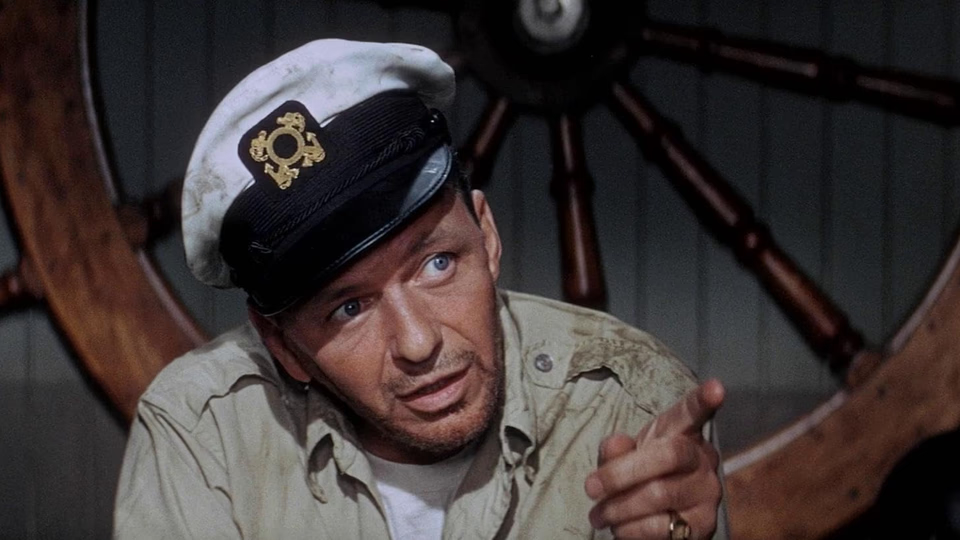Assault on a Queen

As Robert Evans said in The Kid Stays in the Picture, “Assault on a Queen was a B-picture inflated to A status only because it had Sinatra.”
Set in the Bahamas, the story sees Sinatra as an ex-submarine officer who joins up with a treasure-hunting operation financed by Italian bombshell Virna Lisi. They discover a sunken U-Boat and scheme to raise it, restore it, then use it to rob the Queen Mary cruise ship.
By this point, Sinatra’s best pictures were behind him. He’d always hated rehearsals and wanted the productions completed as fast as possible, but strong directors could corral him. Folks like Otto Preminger, John Frankenheimer, and Fred Zinnemann earned Sinatra’s respect and coaxed out his finest performances. Unfortunately, Sinatra proved reluctant to work with such directors later in his career, instead preferring ones he could trust to do the job fast.
Jack Donohue, a television director, falls into this bucket of journeymen directors hired to helm Sinatra’s later projects. With Sinatra’s relentless push for speed, Donohue couldn’t afford the luxury of complex setups, relegating most scenes to standard two-shots or static wides. He also couldn’t push back against Sinatra’s one-take listless performance. He sleepwalks through the film, offscreen in many scenes, and half-reading his dialog in others.
Lisi is equally flat and lacks chemistry with Sinatra, who is old enough to be her father. Granted, in real-life, Sinatra was dating an even younger Mia Farrow, but that’s the world-famous entertainer, not the broke, schlumpy, fishing boat captain he plays here. Indeed, when Sinatra’s character says, “She’s so deep in my gut we breathe together,” I wondered who he was talking about.
The supporting cast doesn’t fare much better. Anthony Franciosa grates as Lisi’s chiseling boy-toy, though his over-the-top performance matches the ludicrous plot. Richard Conte plays a late recruit, another Navy veteran, and has a nice scene with Sinatra, but that’s about it. Alf Kjellin tries for Curd Jürgens level gravitas as a former U-Boat captain, but his over-emoting comes across as comical hissy fits. Only Errol John, who plays Sinatra’s sidekick, seems to fit the material. His measured but charismatic performance feels pulled from a better film, a straight action-adventure with a Hawksian bent.
Of course, the script is no such beast. Adapted from Jack Finney’s novel by Rod Serling, it’s too dry for a thriller, and too off-putting for a fun caper, stalling out awkwardly in between. A shame, as Finney had written The Body Snatchers while Serling created and wrote much of The Twilight Zone. This proved their only quasi-collaboration, and, as Stephen King says in Danse Macabre, “It contains all the preachy, talking-heads stuff that brought so many of (Serling’s) Twilight Zone scripts low. It’s one of the minor tragedies of the field that what might have been an inspired meeting of two like minds should have turned out so poorly.”
The production itself seems just as rushed and disjointed. While the wide shots of the Queen Mary and the Coast Guard Cutters are obviously staged at sea, most others are clearly soundstages with projected backdrops. The special effects prove just as uneven. A scene showing the submarine under the cruise ship as the behemoth starts her engines works, but the scene showing the sunken U-boat rising to the surface looks like it was filmed in an aquarium. The result feels like a prestige picture spliced into a cheap one, or vice versa. Even the music by Duke Ellington fails to register — perhaps an indication of why he composed so few scores. Indeed, one wonders if Sinatra pressed him into the job after singing him to his Reprise record label.
In the end, Evans was right. There’s a good B-picture here. One minus Sinatra that elevates Errol John to the lead, ditches the love interest, and hews closer to the men-on-a-mission formula with a more thrilling heist. But while Sinatra’s presence may have elevated it to A status, it sank the production.